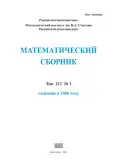Vol 212, No 1 (2021)
- Year: 2021
- Articles: 5
- URL: https://journal-vniispk.ru/0368-8666/issue/view/7473
Critical Galton-Watson branching processes with a countable set of types and infinite second moments
Abstract
We consider an indecomposable Galton-Watson branching process with a countable set of types. Assuming that the process is critical and may have infinite variance of the offspring sizes of some (or all) types of particles we describe the asymptotic behaviour of the survival probability of the process and establish a Yaglom-type conditional limit theorem for the infinite-dimensional vector of the number of particles of all types. Bibliography: 20 titles.
Matematicheskii Sbornik. 2021;212(1):3-27
 3-27
3-27


The Fermat-Steiner problem in the space of compact subsets of $\mathbb R^m$ endowed with the Hausdorff metric
Abstract
The Fermat-Steiner problem consists in finding all points in a metric space $X$ at which the sum of the distances to fixed points $A_1,…,A_n$ of $X$ attains its minimum value. This problem is studied in the metric space $\mathscr{H}(\mathbb R^m)$ of all nonempty compact subsets of the Euclidean space $\mathbb R^m$, and the $A_i$ are pairwise disjoint finite sets in $\mathbb R^m$. The set of solutions of this problem (which are called Steiner compact sets) falls into different classes in accordance with the distances to the $A_i$. Each class contains an inclusion-greatest element and inclusion-minimal elements (a maximal Steiner compact set and minimal Steiner compact sets, respectively). We find a necessary and sufficient condition for a compact set to be a minimal Steiner compact set in a given class, provide an algorithm for constructing such compact sets and find a sharp estimate for their cardinalities. We also put forward a number of geometric properties of minimal and maximal compact sets. The results obtained can significantly facilitate the solution of specific problems, which is demonstrated by the well-known example of a symmetric set $\{A_1,A_2,A_3\}\subset\mathbb R^2$, for which all Steiner compact sets are asymmetric. The analysis of this case is significantly simplified due to the technique developed. Bibliography 16 titles.
Matematicheskii Sbornik. 2021;212(1):28-62
 28-62
28-62


Necessary and sufficient conditions for the conjugacy of Smale regular homeomorphisms
Abstract
The class of Smale regular homeomorphisms of closed topological manifolds, with nonwandering set consisting of a finite number of periodic orbits of hyperbolic type, is considered. This class contains the Morse-Smale diffeomorphisms of smooth closed manifolds. For two Smale regular homomorphisms necessary and sufficient conditions for being conjugate are presented. Bibliography: 26 titles.
Matematicheskii Sbornik. 2021;212(1):63-77
 63-77
63-77


Uniform convergence criterion for non-harmonic sine series
Abstract
We show that for a nonnegative monotonic sequence $\{c_k\}$ the condition $c_kk\to 0$ is sufficient for the series $\sum_{k=1}^{\infty}c_k\sin k^{\alpha} x$ to converge uniformly on any bounded set for $\alpha\in (0,2)$, and for any odd $\alpha$ it is sufficient for it to converge uniformly on the whole of $\mathbb{R}$. Moreover, the latter assertion still holds if we replace $k^{\alpha}$ by any polynomial in odd powers with rational coefficients. On the other hand, in the case of even $\alpha$ it is necessary that $\sum_{k=1}^{\infty}c_k<\infty$ for the above series to converge at the point $\pi/2$ or at $2\pi/3$. As a consequence, we obtain uniform convergence criteria. Furthermore, the results for natural numbers $\alpha$ remain true for sequences in the more general class $\mathrm{RBVS}$. Bibliography: 17 titles.
Matematicheskii Sbornik. 2021;212(1):78-118
 78-118
78-118


Approximation of resolvents in homogenization of fourth-order elliptic operators
Abstract
We study the homogenization of a fourth-order divergent elliptic operator $A_\varepsilon$ with rapidly oscillating $\varepsilon$-periodic coefficients, where $\varepsilon$ is a small parameter. The homogenized operator $A_0$ is of the same type and has constant coefficients. We apply Zhikov's shift method to obtain an estimate in the $(L^2\to L^2)$-operator norm of order $\varepsilon^2$ for the difference of the resolvents $(A_\varepsilon+1)^{-1}$ and $(A_0+1)^{-1}$. Bibliography: 25 titles.
Matematicheskii Sbornik. 2021;212(1):119-142
 119-142
119-142











